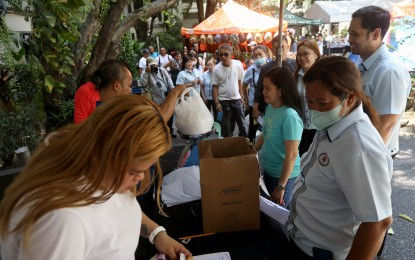At least 40 more sites to sell rice at P29 per kilo
- NewsDesk

- Jul 6, 2024
- 4 min read

CHEAP RICE FOR VULNERABLE SECTORS. Agriculture Assistant Secretary Genevieve Guevarra says during the Saturday News Forum in Quezon City on July 6, 2024 that more sites for the “P29 Rice Program” will open in the next two months. The subsidized program that sells rice for PHP29 per kilogram prioritizes members of the Pantawid Pamilyang Pilipino Program, senior citizens, solo parents and persons with disabilities.
The Department of Agriculture (DA) is looking for at least 40 more sites or “Kadiwa” stores in the next two months that will sell rice at PHP29 per kilogram (kg).
Agriculture Assistant Secretary Genevieve Guevarra said the sites for the “P29 Rice Program” will be in Malabon, Navotas and Mandaluyong in Metro Manila, Cebu province, and Mindanao.
“Dito po sa Luzon, magkakaroon tayo ng additional pa na 10 to 20 (Here in Luzon, we will have 10 to 20 additional sites) for August to September,” she said at the Saturday News Forum in Quezon City.
“There will be centers and stores depende sa laki (ng lugar), kasi usually ang provision natin na puwede mag store, malaki parking, meron din iba puro stores lang (depending on the area, because usually, there should be a large parking area in sites that have storage spaces, while other areas are just stores only),” the DA official added.
The program sells subsidized rice for PHP29 per kg to the vulnerable sectors, including members of the Pantawid Pamilyang Pilipino Program, senior citizens, solo parents and persons with disabilities.
The DA on Friday launched the large-scale trial for program in 10 Kadiwa stores: Bureau of Animal Industry and National Irrigation Administration in Quezon City; Bureau of Plant Industry in Malate, Manila; Food Terminal Inc. in Taguig City; Philippine Fiber Industry Development Authority in Las Piñas; Bayani Fernando Central Terminal and Barangay Fortune in Marikina; and sites in Caloocan, Valenzuela, and City San Jose del Monte, Bulacan.
Kadiwa stores sell other agricultural produce at cheaper prices as farmers and producers directly deal with consumers.
Beneficiaries can purchase the subsidized rice every Friday, Saturday and Sunday, with a limit of 10 kilos per household in five-kilo increments each month.
Each trial site is expected to support 1,500 families per week, or around 60,000 households monthly in all 10 sites.
“Ang pinaka successful ay ‘yung sa San Jose del Monte, Bulacan dahil na-ubos 100 sacks na tig-50 kilos (The most successful was the San Jose del Monte, Bulacan site, which sold out 100 50-kilo sacks),” Guevarra noted.
In total, she said the stores were able to sell more than 25,000 kilos, with a revenue of around PHP750,000 as of Friday.
“Kaya ito pino-promote namin, we’re hoping in the coming days mas marami pang mag-avail lalo na ngayong weekend. Tinitingnan natin kung maraming bibili para next week ay makapag-institutionalize tayo ng modifications (We are promoting this because we are hoping that more beneficiaries would avail, especially this weekend. We are looking if many will buy so that we can institutionalize modifications by next week),” Guevarra said.
The DA target for now is 100 sacks per day.
Guevarra assured that the program is sustainable as they have sufficient stocks.
“Meron po tayo 2,500 metric tons [stock], so doon po sa computation natin (We have 25,000 metric tons in stock, and based on our computation), we can sustain this in the next three to four months,” she said.
The rice stocks are from Batangas and Quezon provinces in Luzon, and some from Visayas and Mindanao.
Overall, the P29 program targets to benefit 30 percent of the population, or around 6.9 million households nationwide.
PAOCC eyes radual POGO phaseout
Illegal Philippine Offshore Gaming Operator hub in Las Piñas City (Photo courtesy of PNP-Anti Cybercrime Group)
An official of the Presidential Anti-Organized Crime Commission (PAOCC) prefers the gradual phaseout of Philippine Offshore Gaming Operators (POGOs) rather than going for a total ban
At the Saturday News Forum in Quezon City, PAOCC spokesperson Dr. Winston Casio said a gradual phasing out and a transitional mechanism would lead to the total eradication of the so-called scam farms.
“So, siguro (maybe) before we direct ourselves to a discussion on total ban, we could probably revisit discussions of phaseout,” Casio said.
He clarified that decisions on POGO is a policy issue.
“That is way… way, way, way above my pay grade. So, on matters like that, we would defer to, first our Executive Secretary (Lucas Bersamin) who’s the chairman of our commission,” he said.
Whatever recommendations Bersamin would provide President Ferdinand R. Marcos Jr., being the chief policymaker, “then we’ll leave it to him. We defer to his decision.”
He said only 42 POGOs are legally operating in the Philippines – one in Kawit, Cavite and the rest in Metro Manila.
He said 298 POGO licenses have been canceled by the government but some are still operating illegally in different parts of the country.
“So kung mayroon ka sa (if there are some in) Northern Luzon, Central Luzon, Calabarzon, Bicol all the way to Mindanao and Central Visayas, ibig sabihin lahat iyon ilegal (then all of those are illegal),” Casio said.
“A good number of them have gone underground,” he added.


Comments